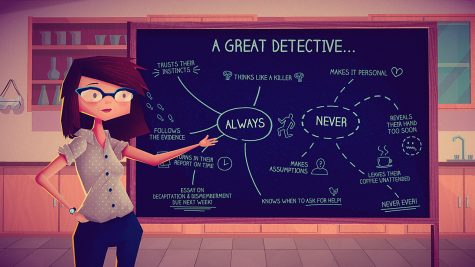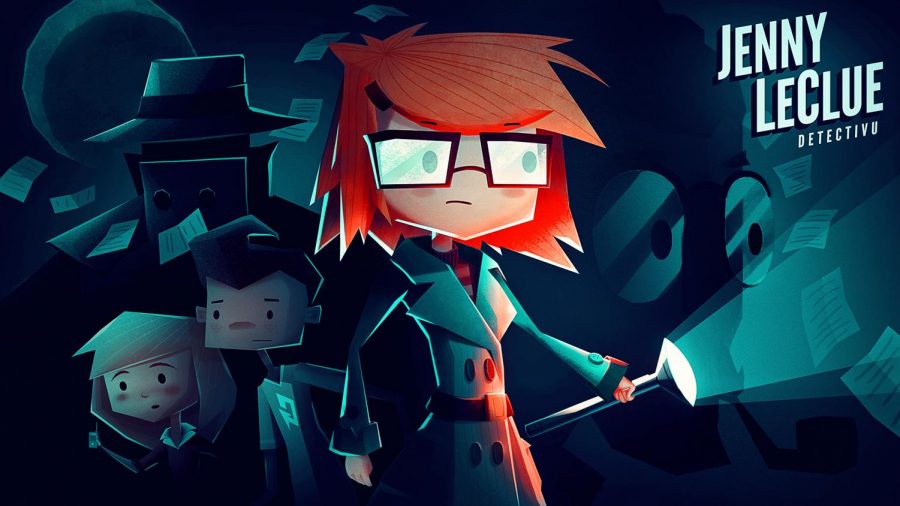Jenny LeClue: Directionless Detective Work
A good detective always makes sure to figure out the full story, but we never get to do that in Jenny LeClue: Detectivú. We were first tipped off to this video game by its criminally good animation and killer trailer, expertly teased by independent game studio Mografi. Needless to say, we entered this case with stars in our eyes. However, despite the optimistic start, this case quickly cracked us. Every piece of evidence pointed in different directions, and the plot never ironed itself out. In fact, this mystery seems to want to leave us in the dark. Although the lighting in JLC (both on the iPad Pro and the Nintendo Switch) is some of the best we’ve ever seen, the empty leads and dead ends cast an incorrigible shadow over what should have been an enthralling mystery game.
We begin our gameplay in small town Arthurton, unfortunately foreshadowing the contrived, trite mystery hijinks to come. A boring town could be an interesting set-up — Harry Potter grew up in a tiny town where nothing ever happened, and more recently, Wandavision played with the idea of how fictitious towns often have sinister forces at play below their sleepy veneers. JLC aims for this mysterious small town set-up, but unfortunately, this is where its case runs cold.
Tropey to a fault, JLC introduces us to its characters, all victims to the crime of underdevelopment. Someone dies. Suddenly, the tired town of Arthurton is shocked awake and we spend the game with young Jenny LeClue as our private eye, figuratively and literally. As we soon learn during the fourth-wall shattering cutscenes, there’s a struggling author who is actually writing the story of JLC in a novel akin to the real-life Nancy Drew series. However, this author seems like a last-minute excuse for the obvious plot flaws and inconsistencies of the game, working to patch up plot holes and kill any genuine tension — just like reaching the end of a book only to realize that the protagonist was dreaming the whole time.
For all the story’s talk of a murder mystery, the true nail in the coffin was the gameplay. With unclear instructions and complex mini-games, every new “case” meant shoveling through hours of puzzles that simply did not deliver the justice promised, leaving us both extremely unfulfilled detectives. The game was originally designed for Apple Arcade (behind a $5 monthly subscription) and goes for up to $25 on all other consoles. Consequently, we experienced the clunky and inaccurate gameplay on both the mobile version on iPad and the Nintendo Switch. Players initially purchase JLC to satiate their hunger for a good indie mystery game, but we must have been shopping on an empty stomach to have clicked “Download.”

And, yet, for all our libel (sue us), JLC boasts wonderful hand-drawn animation. The voice acting is phenomenal and adds a layer of needed whimsy to the game, as well as giving the characters personality that would be completely lacking otherwise. The soundtrack is perfect in every situation and adds weight to unnaturally light scenes and fun to heavy ones. Jenny LeClue was undoubtedly constructed with art as a priority, and it delivers on all artistic fronts except in its story. Some scenes, including a harrowing fever dream, radiate the animators’ talent and leave the player feeling dread and grim satisfaction — exactly what we should be feeling right after the implications of the murder set in.
To wrap up this case, Jenny LeClue succumbs to the trap of underdevelopment and makes a few avoidable blunders — understandable for a rookie detective. After all, it’s the first game to come out of Mografi’s development studio, and an impressive one to be sure. In our defense, two and a half months of torturous gameplay did set us against this indie game, but the time we spent playing it will be some we’ll never forget. The game reeled us in, taunted us with red herrings, but ended up floundering where it mattered most.


